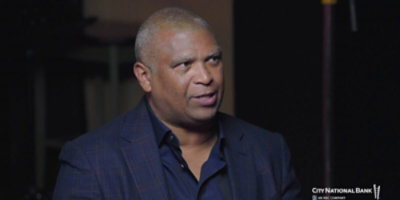-
Business Banking -
In the Industry
Why Musicians Need to Plan for More Than Their Next Gig
Many musicians pursue careers focused more on creative expression than financial gain. But for those who do find both artistic and financial success, it's particularly important to do the work of financial and estate planning, given the unique and evolving nature of the music industry.
While not every musician or performer reaches the same level of acclaim, they all share similar circumstances: multiple streams of sometimes erratic income and a legacy to protect.
“Unlike many other professions, the nature of the music industry is constantly changing,” said Joe Goldman, a senior trust advisor with City National Bank. “For example, revenue sources changed with streaming and, during the pandemic, all income from touring and performing fell off a cliff.”
In other words, musicians need to have a plan for industry and professional changes, whether they're expected or not.
Professional wealth advisors and estate planners can help those in the music industry manage their money now, prepare for the future and control their brand in perpetuity.
“Wherever you are in your life and your career, it’s better to start as soon as possible and make sure your assets are protected, transferred and gifted in the way you want,” said Nichole Walker, a senior wealth planner with City National.
Working With a Full Band
As a musician’s career progresses, it’s typical to work with an agent and a business manager.
“In many cases, performers also have an entertainment attorney to represent them in contract negotiations and to protect their rights,” said Stephanie Saint-Cyr, a senior trust advisor with City National.
Adding wealth and estate planners into the mix offers an opportunity for collaboration between those professionals and the others supporting your music career.
“Entertainment attorneys, agents, business managers and business attorneys know about labels, intellectual property, royalties and rights,” Saint-Cyr said.
However, not all of these players will step back and look at the full picture. Saint-Cyr and City National's Entertainment Banking team work to keep all the instruments of a musician's estate playing in tune.
“Wealth advisors and estate planners bring another level of experience to support the musician and to work with their business managers and other team members. We can keep everyone involved and working together to develop a financial plan that works now and for the musician’s heirs.”
Managing Your Legacy Through Estate Planning
Control over your music and your brand is important to most performers. A team that includes estate planners and wealth advisors, alongside entertainment and business attorneys, can take a holistic approach to your tangible and intangible assets.
Having an estate plan in place can also help your heirs with taxes.
“Estate planning can mitigate taxes for your heirs with the use of a revocable or irrevocable trust," Walker said. "This is especially important now because the gift and estate tax exemption – the amount allowed to be gifted to designated beneficiaries without the imposition of transfer taxes – was significantly raised by the Tax Cuts and Jobs Act of 2017 is set to expire at the end of 2025 and will reduce the exemption approximately in half.”
Estate Planning Can Protect Your Privacy
One early benefit of estate planning is the peace of mind it can provide when it comes to privacy.
"Privacy is a big part of planning, even for less famous musicians," Goldman said. "Without an estate plan, your heirs will be forced to go through the probate process, which is completely public. Most people prefer not to have the recipients of their assets shared with the public.”
Proper estate planning protects your assets from the public display and resulting cost of disputes among your heirs or other beneficiaries such as charities. After Prince died without a will or estate plan in 2016, it took six years and millions of dollars in legal fees to settle the estate among his six siblings.
Protecting the Rights to Your Art
One of the most important aspects of an estate plan for many artists is making sure they protect the rights to their art.
“Someone needs to raise issues with musicians about who owns the rights to their music and what kind of rights they own,” added Gaye Chun, a senior wealth planner with City National.
This process should be thought of sooner rather than later. Chun pointed out that even the biggest names in music have faced challenges when it comes to the rights for their art.
“Taylor Swift is a prime example. Even though she owned the composition of her music, she didn’t own the master recordings," Chun said. To remedy that, Swift was famously obliged to re-record her songs to secure rights to master recordings for most of her catalog.
Chun also added that complications can occur for artists who don't want to retain the rights to their music.
"Even if you want to sell your catalog, you have to understand what you’re selling," she said.
Getting a valuation of your music catalog and other assets contributes to your financial security and the decisions for your estate plan.
“For musicians, an estate plan also needs to encompass different types of royalty streams and intellectual property,” Goldman commented. “They need to think about who will be in charge of monetizing their music and their brand after they die. Who do they want to make decisions about how their image is used, whether their songs can be used in movies or TV shows, or whether they want to be a hologram?”
Many musicians prefer that their music not be used in a particular manner, such as to support political causes, Chun added, which is also something they need to consider and articulate in their plan.
Creating Harmony in Your Estate Plan
Particularly when an artist has been successful in their lifetime, it’s all too common for heirs to argue over their legacy if a well-crafted estate plan hasn't been put in place. An estate planning attorney can help ensure that the artist’s intentions will be clearly stated and that assets are properly administered.
“It only takes two to have an argument,” said Chun. “That’s why it’s so important to formalize everything – to minimize disputes and to protect your legacy.”
The choice of a trustee — or the person who manages your trust — can be an important part of your heritage and can mitigate potential conflict between your heirs. You may want to consider a trustee that has experience in working with performers, such as a corporate trustee or business manager, Goldman said.
“What’s important is to structure this in advance,” Goldman said. “You may want to choose your kids or your spouse, but that can create conflict, especially if you have more than one marriage or kids from more than one partner.”
Artifacts of a successful career, including property like musical instruments, handwritten notes on your music or even clothes worn during performances, can have monetary value as well as sentimental significance to family members. This means it's important to think about those items when planning your estate.
“Many people want to provide equally for their beneficiaries, but that can be difficult when dealing with revenue from music or even with tangible items that may change in value over time,” Walker said.
Whether you’re singing to a handful of listeners in a coffeehouse, performing in stadiums with thousands of fans or your music career has yet to crescendo, it’s always the right time to discuss your future with a team that includes a wealth advisor and an estate planning expert.
This article is for general information and education only. It is provided as a courtesy to the clients and friends of City National Bank (City National). City National does not warrant that it is accurate or complete. Opinions expressed and estimates or projections given are those of the authors or persons quoted as of the date of the article with no obligation to update or notify of inaccuracy or change. This article may not be reproduced, distributed or further published by any person without the written consent of City National. Please cite source when quoting.
City National, its managed affiliates and subsidiaries, as a matter of policy, do not give tax, accounting, regulatory, or legal advice, and any information provided should not be construed as such. Rules in the areas of law, tax, and accounting are subject to change and open to varying interpretations. Any strategies discussed in this document were not intended to be used, and cannot be used for the purpose of avoiding any tax penalties that may be imposed. You should consult with your other advisors on the tax, accounting and legal implications of actions you may take based on any strategies or information presented taking into account your own particular circumstances. Trust services are offered through City National Bank.





